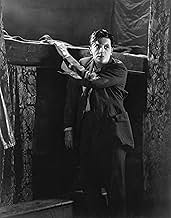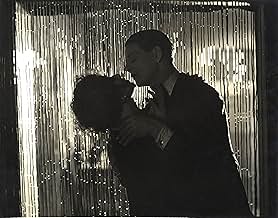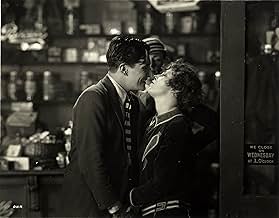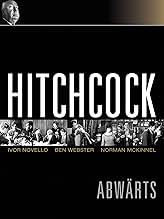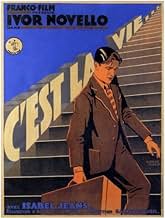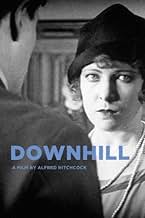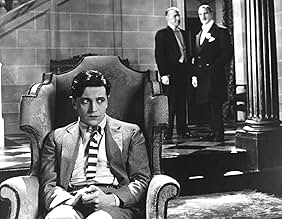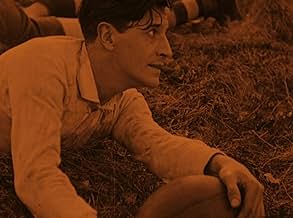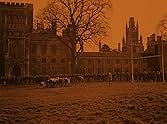ÉVALUATION IMDb
6,0/10
3,3 k
MA NOTE
L'écolier Roddy Berwick est expulsé de son école quand son ami lui fait porter le chapeau et sa vie s'effondre en une série de mésaventures.L'écolier Roddy Berwick est expulsé de son école quand son ami lui fait porter le chapeau et sa vie s'effondre en une série de mésaventures.L'écolier Roddy Berwick est expulsé de son école quand son ami lui fait porter le chapeau et sa vie s'effondre en une série de mésaventures.
Constance Collier
- Dance Hall Lady with Purse
- (uncredited)
Daisy Jackson
- The Seductive Waitress
- (uncredited)
Avis en vedette
I watched Alfred Hitchcock's DOWNHILL (1927) starring Ivor Novello. I thought this was a fascinating film although it's not very well regarded.
Novello plays a wealthy Oxford student who stupidly takes the blame after a vindictive waitress points him out (his father is rich) as her seducer. The real seducer is his friend, but he takes the blame, assuming it will all blow over. But he gets expelled and sent home where his father pitches a fit and calls him a liar. Novello storms out of the house.
Cast into the cruel world, Novello must find his own way. In a brilliant sequence, following an intertitle that announces "make believe" we see a well dressed Novello holding a cup of coffee, but as the camera pulls back we see that he is holding a tray and serving coffee to a flashy couple (Isabel Jeans, Ian Hunter). Well at least he has a job! But then as the couple heads to the dance floor the camera pulls back again and we suddenly realize that, as the couple starts dancing, they are on a stage. The audience comes into view and a line of high-kicking dancers races out onto the stage.
Jeans turns out to be a selfish woman involved with Hunter. There is never enough money. Novello becomes a hanger-on until he receives a telegram with news about an inheritance. Jeans quickly marries Novello and starts spending freely. Time passes. Jeans and Hunter are sitting in a lavish bedroom. She's endlessly sitting at dressing tables, admiring herself and her jewels. Novello comes home and find a pile of bills, an overdrawn notice from the bank, and Hunter in the closet. The apartment is in her name and he's thrown out into the cruel world.
Next we find Novello as a taxi dancer in Paris. He seems to have a "manager" who sells his dances and possibly more. While he dances we see a middle-aged age woman (Violet Farebrother) sitting at a table. She can't take her eyes off him. She arranges for an introduction. He babbles away, telling her his sad story while her eyes frankly devour him. Amazing sequence. But as morning dawns and the blinds are raised, Novello finally see this tawdry world of drunks and dissolutes and once again goes out into the cruel world to Marseilles.
Sick and broke, Novello is saved by a pair of sailors and put on a ship back to England after they find a returned letter. Do they think there will be a reward? During the voyage, Novello hallucinates and relives his past accounts with all the horrid women in his life. This is a beautifully done scene. Finally he arrives home.
I cannot think of another film from this era where the male is the societal victim and who, through nobility, suffers as he descends to the depths at the hands of women. Novello is actually playing a twist on the many Ruth Chatterton roles where she follows this sort of journey to find redemption and/or death. Along with The Lodger, this may be Ivor Novello's best film performance.
As for Hitchcock, there are many great scenes here and lots of symbolism as Novellos is seen on escalators and elevators going down, down, DOWN.
Novello plays a wealthy Oxford student who stupidly takes the blame after a vindictive waitress points him out (his father is rich) as her seducer. The real seducer is his friend, but he takes the blame, assuming it will all blow over. But he gets expelled and sent home where his father pitches a fit and calls him a liar. Novello storms out of the house.
Cast into the cruel world, Novello must find his own way. In a brilliant sequence, following an intertitle that announces "make believe" we see a well dressed Novello holding a cup of coffee, but as the camera pulls back we see that he is holding a tray and serving coffee to a flashy couple (Isabel Jeans, Ian Hunter). Well at least he has a job! But then as the couple heads to the dance floor the camera pulls back again and we suddenly realize that, as the couple starts dancing, they are on a stage. The audience comes into view and a line of high-kicking dancers races out onto the stage.
Jeans turns out to be a selfish woman involved with Hunter. There is never enough money. Novello becomes a hanger-on until he receives a telegram with news about an inheritance. Jeans quickly marries Novello and starts spending freely. Time passes. Jeans and Hunter are sitting in a lavish bedroom. She's endlessly sitting at dressing tables, admiring herself and her jewels. Novello comes home and find a pile of bills, an overdrawn notice from the bank, and Hunter in the closet. The apartment is in her name and he's thrown out into the cruel world.
Next we find Novello as a taxi dancer in Paris. He seems to have a "manager" who sells his dances and possibly more. While he dances we see a middle-aged age woman (Violet Farebrother) sitting at a table. She can't take her eyes off him. She arranges for an introduction. He babbles away, telling her his sad story while her eyes frankly devour him. Amazing sequence. But as morning dawns and the blinds are raised, Novello finally see this tawdry world of drunks and dissolutes and once again goes out into the cruel world to Marseilles.
Sick and broke, Novello is saved by a pair of sailors and put on a ship back to England after they find a returned letter. Do they think there will be a reward? During the voyage, Novello hallucinates and relives his past accounts with all the horrid women in his life. This is a beautifully done scene. Finally he arrives home.
I cannot think of another film from this era where the male is the societal victim and who, through nobility, suffers as he descends to the depths at the hands of women. Novello is actually playing a twist on the many Ruth Chatterton roles where she follows this sort of journey to find redemption and/or death. Along with The Lodger, this may be Ivor Novello's best film performance.
As for Hitchcock, there are many great scenes here and lots of symbolism as Novellos is seen on escalators and elevators going down, down, DOWN.
Classmates and close friends at an English public school, Roddy Berwick and Tim Wakely compete for the affections of a local shop girl. When the girl falsely accuses Roddy of getting her pregnant, he is expelled. However, Roddy remains silent to protect Tim, who was the guilty party, and the friends make a pact to keep silent. Outraged at his expulsion, Roddy's father does not believe his son's claims of innocence and throws him out. Thus, Roddy strikes out on his own, and his life begins a downward spiral from stage acting to a disastrous marriage to taxi dancing to the Marseilles waterfront. "When Boys Leave," also known as "Downhill," was Alfred Hitchcock's fifth completed film, and, early on in his career, the master director explores his oft-repeated theme of the wrongfully accused.
Shot in 1927, the film is silent with inter-titles, and the black-and-white cinematography is often well lit with striking visual compositions. However, Hitchcock generally holds the camera steady, and movement occurs within the frame. The film lacks the camera fluidity common among movies of the late silent era, although Hitchcock is already a master of visual story-telling, and the inter-titles are brief and sparse. As Roddy's life reels out of control, he is dwarfed by his surroundings in rooms with impossibly high ceilings and doors that are more than twice his height. Fortunately, Hitchcock elicits naturalistic performances from his cast, and none indulges in the grand style of acting that negatively stereotyped silent movies. Ivor Novello, a Welsh matinée idol best known for his musical talents, plays the suffering Roddy quite well. Isabel Jeans as Julia Fotheringale, a spendthrift actress, and Ian Hunter as Archie, Julia's shady lover, provide amusing support during one colorful episode in Roddy's descent.
"When Boys Leave" is from Hitchcock's apprentice period in England, when he was still learning the craft. While the story is thin, and the motivations vague, this short silent film shows flashes of the genius to come, and, for students of the master, every Hitchcock film is worthwhile viewing.
Shot in 1927, the film is silent with inter-titles, and the black-and-white cinematography is often well lit with striking visual compositions. However, Hitchcock generally holds the camera steady, and movement occurs within the frame. The film lacks the camera fluidity common among movies of the late silent era, although Hitchcock is already a master of visual story-telling, and the inter-titles are brief and sparse. As Roddy's life reels out of control, he is dwarfed by his surroundings in rooms with impossibly high ceilings and doors that are more than twice his height. Fortunately, Hitchcock elicits naturalistic performances from his cast, and none indulges in the grand style of acting that negatively stereotyped silent movies. Ivor Novello, a Welsh matinée idol best known for his musical talents, plays the suffering Roddy quite well. Isabel Jeans as Julia Fotheringale, a spendthrift actress, and Ian Hunter as Archie, Julia's shady lover, provide amusing support during one colorful episode in Roddy's descent.
"When Boys Leave" is from Hitchcock's apprentice period in England, when he was still learning the craft. While the story is thin, and the motivations vague, this short silent film shows flashes of the genius to come, and, for students of the master, every Hitchcock film is worthwhile viewing.
Silent film directed by Alfred Hitchcock about a wealthy young man named Roddy (Ivor Novello) who takes the blame for a friend's indiscretions with a tramp and finds his whole life unraveling because of it. Not entirely successful, with a yawner of an ending, but worth a look for Novello's performance and glimpses of Hitchcock's emerging style. Tenth-billed Ian Hunter plays a small role as an actor who helps rip Roddy off. The whole thing is filmed in sepia tone except for a section in green, the reason behind which is actually fairly clever. Watch and I'm sure you'll figure it out. It's a decent picture but it goes on too long. Lost my interest well before the disappointing ending. Still, give it a go and form your own opinion. Even a lesser Hitchcock film is worth seeing.
The story, of course, is not acceptable now. It's based on a play written by two performers who were major stage figures in their time but are now principally remembered for a few film roles (Novello in Hitchcock's THE LODGER, Collier as the has-been actress teaching acting to young girls in LaCava's STAGE DOOR). The story tells of the long, melodramatic, total downfall and degeneration of a son of wealth with a seemingly bright future, the hero of the rugby field, who is disgraced when he takes the rap for his impoverished roommate at his British school. Modern audiences tend to find this sort of melodrama, no matter how well done, a bit ridiculous. The anguished query of young Novello when he's told that he's expelled, "Does this mean, sir, that I won't be able to play rugby for the Old Boys?" is justly famous for its fatuousness. But the film itself is not fatuous, or ridiculous in the slightest. It shows Hitchcock to be one of the greatest of all the masters of the silent cinema, using an array of sophisticated film techniques to build a narrative complexity that goes far beyond the melodramatic plot. The pictorial quality of the film is lush and dense and the photography is sophisticated.
For one thing, he uses very few titles. Of course, he was not alone in trying to keep silent-film intertitles to a minimum. But directors like Murnau tended to tell simple "timeless" stories with very formal pictography, the story told through a series of strong, simple, iconic images, the characters hardly speaking. Hitchcock has preserved verisimilitude by having his characters talk as much as they want. If what they're saying isn't important, such as the small talk among the rugby spectators at the beginning, why show it in titles? The casual milieu is established more clearly, in fact, if one doesn't know exactly what's being said. Hitchcock's use of this technique is even more evident in THE FARMER'S WIFE (also adapted from a play), where the characters talk and talk, but rarely is there a title. We talk constantly in real life, and one of the things that makes some silents seem stilted is the refusal to have the characters say anything unless what they say is shown in a title.
Even when characters reveal their inner feelings to each other, the words they speak are often not the best communicators. Hitchcock shows relationships through subtle facial expressions, body posture, and observant human movements, through editing, little close-ups or vignettes of action, and placement of camera. All sorts of naturalistic bits of business are used to make the story clear and dramatically interesting. These techniques convey subtle relationships even more strongly when titles are not there to "explain" the content in words to the viewer, undercutting the images.
Amid symbolic images of his "descent," such as traveling down London's endless escalators to the underground trains, and riding down in an elevator, the story of Novello's decline is laid out in melodramatic detail. A few incidents, and Hitchcock's handling of them, are described below.
The film opens on the day of a big rugby game, and the visiting families dine with the students in the school's great dining hall. At one point, the sister of Novello's poor roommate steps into a stairwell and sees two small boys fighting on the stair. Then a door opens, and she glimpses Novello toweling up after a shower. Nothing comes of either of these incidents (she doesn't see Novello again); they are just original, well staged, atmospheric moments. Having attended a British boarding school for a year in the fifties, I can attest that these are particularly telling touches. Long, aimless, vicious fights were a hallmark of that existence, and I also remember incidents of women embarrassed at being out of place in a boys' school.
The roommate gets a note from the attractive waitress to meet him at the sweet shop where she works. At the same time, she flirts with Novello. The two young men visit the girl at the sweet shop, and there's a long scene where each of them dance with her in a back room. She obviously favors Novello, and Hitchcock cuts from shots of Novello dancing with the shop-girl to the gradually disapproving stare of his companion. However, as the other fellow goes out, she points to the sign "Closed Wednesday Afternoons," a typical example of visual storytelling which not only economically indicates (without titles) that she has asked him to return, but also the furtive nature of the invitation. Later, she comes to the school and accuses Novello of making her pregnant (not of theft, as the IMDB synopsis and other sources state). She accuses him, apparently, because she was mad at him for ignoring her, and because he's rich and can presumably pay off. The actress playing the shop girl (Daisy Jackson, per a photo caption in the Citadel Hitchcock book, though she isn't in any credits listing, including in that book and IMDB) is very attractive and an excellent silent film actress.
After Novello is cast out of his father's house, the scene changes, with a title, "Make Believe." We see Novello in a tuxedo, talking. The camera pulls back and we find him a waiter. After some action, the scene is revealed to be part of a musical; he's a stage actor now. "Make believe" for sure; first we think he's in high society, then a waiter, finally an actor!
After falling further, we find him in France, a male taxi-dancer under the thumb of an iron-handed battle-ax. He spends an evening at the table of an older woman (Violet Farebrother) who sympathetically listens to his life story. But at the end of the evening, so late that it's now morning, a man has an attack and the windows are opened to let in fresh air. The glaring sunlight floods into the foul night-spot, and Novello looks around at the dissipated, apathetic revellers, looks at the now-much-faded "interesting" older woman, and realizes the horror of his surroundings. The scene exudes a profound sense of revulsion and loathing, a depth of feeling on a plane rarely found in Hitchcock.
Finally, Novello is fever-stricken and delirious in a dockside dive, cared for by scruffy blacks. As they pile him on to a small steamer, his shaky passage to the ship, on the gang-plank and into the cabin is presented in striking hand-held point-of-view shots.
The sophisticated narrative style, the profusion of telling details, the richness of the visuals, all made the film gripping and dramatic, despite the hoary plot and a slight over-length. Before Hitchcock found his "niche," he used his talents to make quite a few unexpectedly eclectic films that showed a remarkable talent, constantly inventive and original, continually using film in creative ways. His silent films are largely ignored because they, for the most part, do not conform to the Hitchcock subject matter. But he's one of the great silent directors! He understood the medium and used it more subtly and creatively than many more famous practitioners.
For one thing, he uses very few titles. Of course, he was not alone in trying to keep silent-film intertitles to a minimum. But directors like Murnau tended to tell simple "timeless" stories with very formal pictography, the story told through a series of strong, simple, iconic images, the characters hardly speaking. Hitchcock has preserved verisimilitude by having his characters talk as much as they want. If what they're saying isn't important, such as the small talk among the rugby spectators at the beginning, why show it in titles? The casual milieu is established more clearly, in fact, if one doesn't know exactly what's being said. Hitchcock's use of this technique is even more evident in THE FARMER'S WIFE (also adapted from a play), where the characters talk and talk, but rarely is there a title. We talk constantly in real life, and one of the things that makes some silents seem stilted is the refusal to have the characters say anything unless what they say is shown in a title.
Even when characters reveal their inner feelings to each other, the words they speak are often not the best communicators. Hitchcock shows relationships through subtle facial expressions, body posture, and observant human movements, through editing, little close-ups or vignettes of action, and placement of camera. All sorts of naturalistic bits of business are used to make the story clear and dramatically interesting. These techniques convey subtle relationships even more strongly when titles are not there to "explain" the content in words to the viewer, undercutting the images.
Amid symbolic images of his "descent," such as traveling down London's endless escalators to the underground trains, and riding down in an elevator, the story of Novello's decline is laid out in melodramatic detail. A few incidents, and Hitchcock's handling of them, are described below.
The film opens on the day of a big rugby game, and the visiting families dine with the students in the school's great dining hall. At one point, the sister of Novello's poor roommate steps into a stairwell and sees two small boys fighting on the stair. Then a door opens, and she glimpses Novello toweling up after a shower. Nothing comes of either of these incidents (she doesn't see Novello again); they are just original, well staged, atmospheric moments. Having attended a British boarding school for a year in the fifties, I can attest that these are particularly telling touches. Long, aimless, vicious fights were a hallmark of that existence, and I also remember incidents of women embarrassed at being out of place in a boys' school.
The roommate gets a note from the attractive waitress to meet him at the sweet shop where she works. At the same time, she flirts with Novello. The two young men visit the girl at the sweet shop, and there's a long scene where each of them dance with her in a back room. She obviously favors Novello, and Hitchcock cuts from shots of Novello dancing with the shop-girl to the gradually disapproving stare of his companion. However, as the other fellow goes out, she points to the sign "Closed Wednesday Afternoons," a typical example of visual storytelling which not only economically indicates (without titles) that she has asked him to return, but also the furtive nature of the invitation. Later, she comes to the school and accuses Novello of making her pregnant (not of theft, as the IMDB synopsis and other sources state). She accuses him, apparently, because she was mad at him for ignoring her, and because he's rich and can presumably pay off. The actress playing the shop girl (Daisy Jackson, per a photo caption in the Citadel Hitchcock book, though she isn't in any credits listing, including in that book and IMDB) is very attractive and an excellent silent film actress.
After Novello is cast out of his father's house, the scene changes, with a title, "Make Believe." We see Novello in a tuxedo, talking. The camera pulls back and we find him a waiter. After some action, the scene is revealed to be part of a musical; he's a stage actor now. "Make believe" for sure; first we think he's in high society, then a waiter, finally an actor!
After falling further, we find him in France, a male taxi-dancer under the thumb of an iron-handed battle-ax. He spends an evening at the table of an older woman (Violet Farebrother) who sympathetically listens to his life story. But at the end of the evening, so late that it's now morning, a man has an attack and the windows are opened to let in fresh air. The glaring sunlight floods into the foul night-spot, and Novello looks around at the dissipated, apathetic revellers, looks at the now-much-faded "interesting" older woman, and realizes the horror of his surroundings. The scene exudes a profound sense of revulsion and loathing, a depth of feeling on a plane rarely found in Hitchcock.
Finally, Novello is fever-stricken and delirious in a dockside dive, cared for by scruffy blacks. As they pile him on to a small steamer, his shaky passage to the ship, on the gang-plank and into the cabin is presented in striking hand-held point-of-view shots.
The sophisticated narrative style, the profusion of telling details, the richness of the visuals, all made the film gripping and dramatic, despite the hoary plot and a slight over-length. Before Hitchcock found his "niche," he used his talents to make quite a few unexpectedly eclectic films that showed a remarkable talent, constantly inventive and original, continually using film in creative ways. His silent films are largely ignored because they, for the most part, do not conform to the Hitchcock subject matter. But he's one of the great silent directors! He understood the medium and used it more subtly and creatively than many more famous practitioners.
I just watched this film which I purchased on Ebay. I am a fan of Ivor Novello primarily because of his operatic musicals of the thirties and forties. I saw The Lodger recently and was impressed with his performance, read a biography or two, enjoyed Jeremy Northam's portrayal in Gosford Park, and am hunting for other performances in the cinema. This movie is very well done and adds an interesting insight into Hitchcock's early career. The quality of the acting, photography, use of symbolism are undeniable. I thought the impression that women are a bit dangerous was a major point but at least his mother cared about him although she didn't seem to resist his father's impulsive banishment. This is a film which held my interest throughout and I highly recommend it.
Le saviez-vous
- AnecdotesThe £30,000 Roddy inherits would have equated to about $143,000 at the time (in 1927), and that amount equals over $2.5M in 2023.
- GaffesWhen Roddy and the girl are dancing in the candy shop, a gramophone record of a tune called "I Want Money" is shown. It's on the old "WINNER" label. In a flashback, it's playing again on the record player, but in a further flashback, in a montage, the record has become a "His Master's Voice" disc.
- Citations
[first title card]
Title Card: Here is a tale of two school-boys who made a pact of loyalty. One of them kept it - at a price.
- ConnexionsFeatured in Shepperton Babylon (2005)
- Bandes originalesI Want Some Money
Words by Herbert Rule & Fred Holt.
Music by L. Silberman.
Played on the gramophone machine by Mabel; even though Downhill is a silent film, the accompanying music would have referenced this song as it underscores elements of the plot.
Meilleurs choix
Connectez-vous pour évaluer et surveiller les recommandations personnalisées
Détails
- Date de sortie
- Pays d’origine
- Langue
- Aussi connu sous le nom de
- When Boys Leave Home
- Lieux de tournage
- société de production
- Consultez plus de crédits d'entreprise sur IMDbPro
Box-office
- Brut – à l'échelle mondiale
- 158 $ US
- Durée1 heure 20 minutes
- Couleur
- Mixage
- Rapport de forme
- 1.33 : 1
Contribuer à cette page
Suggérer une modification ou ajouter du contenu manquant


